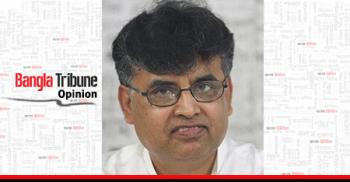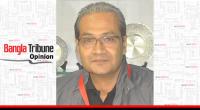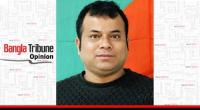 One of the elderly journalists lives in the journalist colony at Mirpur in Dhaka. He used to share the deplorable shape of his life with his previous colleagues. With tears, he shares that he would have been one of the happiest men in this city. He owns a five-storied building at that journalist colony; he has two children, one son and one daughter. Daughter has got espoused to a good fellow of her same profession and living a jubilant life. His son is two years junior to his elder daughter. This boy would have been same to his sister. In the early age of this boy, he was more brilliant than his sister, but he could not finish his school graduation even. Now he sometimes bites his old father for money and spends at least one thousand taka for having drugs. He cannot pass a single day without having drugs. It is one of the true stories of a middle class in Dhaka city, and there are thousands of same stories in the middle-class families in Dhaka and other cities in Bangladesh.
One of the elderly journalists lives in the journalist colony at Mirpur in Dhaka. He used to share the deplorable shape of his life with his previous colleagues. With tears, he shares that he would have been one of the happiest men in this city. He owns a five-storied building at that journalist colony; he has two children, one son and one daughter. Daughter has got espoused to a good fellow of her same profession and living a jubilant life. His son is two years junior to his elder daughter. This boy would have been same to his sister. In the early age of this boy, he was more brilliant than his sister, but he could not finish his school graduation even. Now he sometimes bites his old father for money and spends at least one thousand taka for having drugs. He cannot pass a single day without having drugs. It is one of the true stories of a middle class in Dhaka city, and there are thousands of same stories in the middle-class families in Dhaka and other cities in Bangladesh.
A fortnight back, along with some friends (all were writers and poets), we went for an outing on weekend at village area in Rupganj, nearby Dhaka. When our cars were passing slowly on a road covered both sides by the woodland, suddenly we noticed some boys hiding by running inside the forest deciphering our cars. We stopped our cars thinking our security, but the people who were from Rupganj with us got out from the car and asked us to not get worried about the matter because the boys who were running in the forest are drug addicted and were having drugs, seeing the cars they went to deep woodland. We met some social workers and journalists of that area; they discussed with us about the problem of the drug addiction, and all the parents of that area are worried about their boys regarding drug addiction.
Some days ago, a video had gone viral on Facebook; it was the video of the garage of Dhaka University. Some of the corners of it were full of blank bottles of phensedyl and some unknown packs, but on Facebook it was marked as packages of drugs.
It was two thousand four or five; I used to walk in the evening at Khilgaon area in Dhaka. One day while I was going with my kid, one elderly man with white beard was returning from the mosque, there we exchanged our greetings, after that, he told me, why I would be going inside this road with a kid as the road was not a good area. In the evening, drug dealers sell their drugs there, so any type of occurrence might be happened there. Therefore, it was not wise to go inside that road with a kid. According to his advice, I returned from there.
More or less it is the scenario of the Dhaka and its adjacent area. As a key person of a national daily now I have to contact all over the country. I got a scenario regarding drugs in most of the areas of the country. Now not only the city and the suburb, the drug is entering into the remote villages additionally.
I came to know first as a reporter in eighty four and eighty five that drug was hitting in Bangladesh. Then opium and heroin were the main drugs. As a reporter, I knew that some powerful ladies of the then Ershad's military-ruled regime were involved with this business. Then it was totally impossible to publish a report on that issue. However, then I did some study on that issue, and through that study, I came to know the route of the drug. In this area they have made a network through some countries which are Hong Kong, Thailand, the eastern part of China, Myanmar, Bangladesh, India, Pakistan, and Afghanistan. Then I read some books on opium culture in Afghanistan, Myanmar, and Thailand. Besides I read some books regarding this drug business in Africa. Then I could know that business of drug, illegal arms, and human trafficking are in the same network. In democratic countries many powerful Politicians, in military-ruled countries many Generals, in communist-ruled countries many Comrades, and in Islamic fundamentalist- ruled countries many fundamentalist leaders were involved with this network. Basically, it is a mammoth underground business world, and in that world, comrades to fundamentalists all are in the same plate. Besides, in country like Pakistan, the drug traders run a parallel government. Moreover, in Pakistan and Afghanistan, the entire Islamic terrorists were run by the money of that network. Two or three years back, I read some case-history of some Islamic terrorists, in all the case-histories, I got two things are common, one is in every terrorist attack whether in India or in Sweden, there was a Pakistani connection, and second is a handful amount of money comes from the drug business.
However, after knowing about Khilgaon drug spot in Dhaka, I started to search the root of the drug business in Bangladesh. Then I was a senior assistant editor at The Daily Janakantha, so I had more time to search news; in spite of that, then I did not give up the reporting, still, I did not give it up, but now I get less time to maintain the sources. Hence, then I had more sources which led me to get a root of drug and illegal arms in Bangladesh. I came to know that the most powerful man of the then time in the country was involved with it. He had some international partners. They had two hotels in Chittagong, three in Cox’s bazar, one in Thailand, and one in Dhaka only for the drug business purpose. The most powerful man of the then time sometimes stayed in the hotel in Chittagong, interestingly those hotels were maintaining a very few borders, and according to my sources, at least three times at night, the most powerful man of the then time used to go with some of his foreign friends from Chittagong to Cox’s bazar by road.
After getting some documents and some information through other ways, I decided to do this report, and for doing this I was ready to give up my job. Some of my friends told me that they would manage some sponsor organizations or institutes for me. However, it did not happen. But it helps me to understand the then illegal arms and drugs route. Even I got much first-hand information about how the Indian outlaw groups were involved with this network, but they were much more involved with illegal arms business.
In 2009, when the present government came in the power, they went heavily on illegal arms, and Indian outlaw groups along with the Pakistani Inter Service Intelligence (ISI) man. Government has achieved at least seventy to eighty percent success to prohibit the Indian outlaw groups and the illegal arms business. Unfortunately, the government could not understand that they have deported the main man of the Indian outlaw groups, and they have made the ISI people bound to leave Bangladesh, after that, they have been discontinuing the illegal arms business in the soil of Bangladesh, that is true, but what is next? With this object, the government could not understand, although they have driven the Indian outlaw groups away and have made them bound to discontinue the illegal arms business, their illegal money is still here, and money never stays in an indolent position. Eventually, they diverted all the money of their network to human trafficking and drug business. Three years back government went heavily on human trafficking, and the South East Asian countries also helped on this operation. For this reason, government became successful to make them discontinuing the human trafficking business. So, in the hand of that network there is only one business that is drug business, therefore, they diverted their most of the money to the drug business. That is why now the drug is a demon in Bangladesh.
The government is now fighting wholeheartedly with this demon; the head of the government addressed it as a ‘war against drugs’. For saving the nation, the government has no way without war against drugs. The way government is advancing will be criticized by the human rights groups; in the meantime, some human right groups already have expressed their comments. But the reality is that drug is killing more people every day and it can destroy a generation. So sometimes for the greater cause, the nation has to sacrifice some human rights though is not acceptable in the language of the law. But the government is always for the people.
Swadesh Roy, Executive Editor, The Daily Janakantha, Dhaka, Bangladesh. He is a highest state award winning journalist and can be reached at [email protected].


